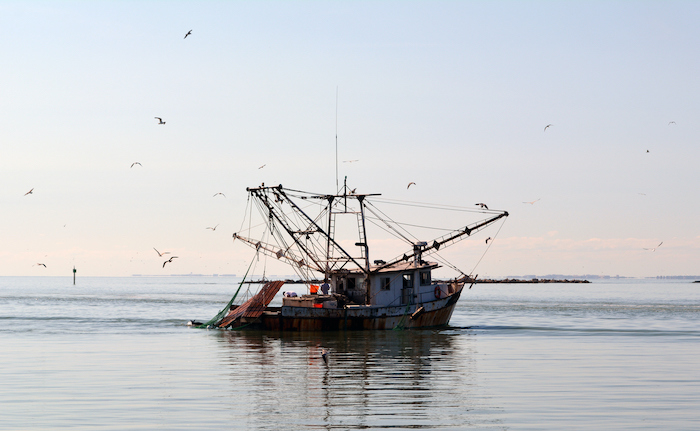 PaaschPhotography
|
An NGO group in Japan called for actions to effectively tackle illegal, unreported and unregulated (IUU) fishing. The AntiIUU Fishing Forum, a coalition of the Japanese NGOs working on IUU fishing and sustainable fishery issues, submitted a joint proposal this July to the Fisheries Agency in regards to the selection of fish species for import regulation measures in pursuance with “The Improvement of Domestic Trade of Specific Marine Animals and Plants Act” (hereinafter referred to as the “Seafood Distribution Improvement Act”). The Forum proposes that the regulations should eventually cover all fish species. The Forum submitted a “Joint Proposal” that under the Act, traders of designated fish and seafood commodity species will be required to furnish catch certification for such species. Until now, the selection of species has been contentious, however, to eliminate IUU fishing, it is considered vital to cover all fish and seafood commodity species. Lenient regulations and non-compliance with the Act would threaten and seriously undermine the conservation and sustainable management of fishery resources and marine ecosystems. The EU is the world’s largest seafood import market and it requires all fish species to be furnished with catch certification. In the United States, which is the world’s second largest seafood market, a bill was submitted to the House of Representatives to also require catch certification for all fish species The Forum pointed out that “all fish species are at risk of being exposed to some form of IUU fishing, and if only certain fish species are targeted, there is a risk that they will slip through the regulations as non-target species.”
IUU fishing is driving the depletion of marine resources, currently only 6.2% of the world’s oceans have enough fish that can be caught sustainably.
According to the International Plan of Action to Prevent, Deter and Eliminate IUU Fishing, illegal means, “operating without the permission of the state or fisheries management agency or in violation of national or international law.” Unreported is defined as, “failing to report, or falsely reporting or misreporting activities or catches during operations in violation of laws or regulations.” And unregulated is defined as, “operating by stateless or non-member vessels of a fishery management agency in an area without complying with regulations or international laws on marine resource conservation.” In the case of the U.S., the term “unregulated” is defined as “vessels that are stateless or not members of a fishery management organization operating in an area complying with regulations or international laws on marine resource conservation.”
IUU fishing is the practice of catching more than the specified amount of fish or bycatch of endangered species, fishing outside of specified fishing grounds, using non-compliant fishing gear, or fishing out of season. According to a study by the Food and Agriculture Organization of the United Nations (FAO), 90% of the world’s marine resources were in a sustainable state in 1974. By 2017 however, the percentage had declined to 65.8%. The study also noted that 59.2% of fishermen are fishing to the limit of sustainability and only 6.2% of fish is fished sustainably. In addition, IUU fishing is associated with a high incidence of human rights violations and other criminal activities.
Selection of target fish species is underway for “The Improvement of Domestic Trade of Specific Marine Animals and Plants Act” that will be enforced in 2022.
The EU and the U.S. are actively working on import restrictions and traceability. Japan adopted the “Seafood Distribution Improvement Act” in December 2020, and is currently examining the selection of “Specified Class II Aquatic Animals and Plants.” (Fish species that are subject to import regulation measures for which catch certification is required for import and export, on the grounds of high IUU fishing risk at an international level.) This is stipulated in Article 2, Paragraph 4 of the Act, along with the establishment of bylaws for its actual introduction.
The proposal submitted by the Forum will make the system introduced in Japan more effective at eliminating IUU fishing, will prevent the outflow of IUU fishery products, and will be a key link to the future growth of Japan’s fishery industry. The World Wildlife Fund (WWF) Japan, Sailors for the Sea Japan, The Nature Conservancy and Seafood Legacy are members of the Forum that formulated the proposal. As a basic premise for the selection of fish species under the Act, the proposal states that “ultimately, in order to eliminate IUU fishing, all fish species should be covered by the Act so that their import and export is accompanied by catch certification.”
The reason for this is that “there are many opaque areas in the supply chain of imported marine products, and there is a risk that all fish species may be exposed to some form of IUU fishing,” and “if specific fish species are targeted, there is a risk that they may slip through the regulations by misrepresenting that they are not targeted. Thus, it is desirable to cover all species in order to ensure fair competition in the fisheries market. The United States is the leader in regulating imports of IUU fisheries products and deemed it necessary to introduce import regulation measures for all species as a way to eliminate IUU fishing.
Difficult to select all fish species at the outset, risk analysis after preliminary selection with reference to the United States
The proposal notes, however, that “it is difficult to conduct risk assessments for all imported fish species, and it is difficult to cover all fish species at the introduction of the system.” It refers to the “Procedures and Principles” of the United States, which began operating an import monitoring system for marine products in 2018 and covers 13 fish species. “Criteria for the selection of target fish species in Japan” were proposed, taking into account Japan’s unique current situation. The proposal suggests first pre-selecting species for risk analysis based on certain criteria, then conducting a detailed risk analysis.
Specifically, the criteria for pre-selection include: “species with large import value (e.g., the top 20),” “species with high price per weight,” “species that have been acknowledged by experts and the media as having a high risk of IUU,” and “species that have been reported to be declining in stock.” Further evaluation of the risk analysis of the pre-selected species then takes into account: “Whether the fishing vessel is on the IUU list,” and “Whether the management of the ship; by a flag state, a coastal state, or a regional fisheries organization, is functioning effectively.” The proposal also stated that the “transparency of the distribution process of the fish species” must be confirmed.
Proposal to create a roadmap for the early expansion of target fish species
The proposal also pointed out that “it is important to implement an IUU risk management equivalent to that of the Seafood Distribution Improvement Act” for fish species currently controlled under the Foreign Exchange and Foreign Trade Law, such as tuna, which has been the subject of many international IUU fishing cases. The proposal also suggests the creation of a roadmap for the early expansion of fish species covered by the law, including an official timetable for the next steps, such as the “verification of the measures taken up to that point and discussions on the expansion of fish species covered by the law after a certain number of years from the start of enforcement.
Mr. Shuhei Uematsu of WWF Japan’s Marine Fisheries Group, speaking on behalf of the Forum, said, “the Seafood Distribution Improvement Act is an important law that will not only help eliminate IUU fishing worldwide, but also protect Japan’s fisheries. In order to maximize the effectiveness of this Act, it is important to create a roadmap to cover all fish species in the future and to coordinate with all related parties to achieve this goal. The entire Japanese fishing industry must unite to accelerate efforts to eradicate IUU fishing.”
The Fisheries Agency has formed a study group to develop a system for appropriate distribution of fishery commodities. The group consists of 17 members, including representatives of industry groups such as the National Fisheries Wholesalers Association, related departments of supermarkets, trading companies, as well as experts and officials from WWF-Japan and Seafood Legacy (a member of the IUU Forum). The study group met three times as of July 2021 and has been discussing the selection of species for obligatory catch certification in connection with import and trade. It was reported on October 21st 2021 that the Fishery Agency plans to propose catch certification requirements for abalone and sea cucumbers from December 2022, and glass eel from December 2025. Such species will be specified by bylaws under the Act.
Ms. Tomoko Hirosue wrote the original article and Sustainable Brands Japan published it in Japanese on July 29th 2021. The Environment Partnership Council translated the original article into English with some adjustments in the light of subsequent developments observed up to the end of November 2021. The English article was published on December 9th 2021.










